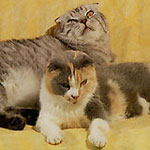Breed: Scottish Fold
Temperament: loving, inactive
Maintenance: low (shorthair), medium (longhair)
Cost: from $450
Lifespan: 10-15 years
Recommended for: units, elderly, couch potatoes
History
In 1961 a white kitten, just one of a litter of farm kittens, was born in a barn in Perthshire, Scotland. What apparently set this kitten apart from the rest of the litter however was its peculiar ears. The result of a spontaneous mutation, the ears were folded down towards the nose.
This kitten was the beginnings of the Scottish Fold breed.
Two years later, this cat, a female, gave birth to a similar kitten. Over time it became evident that if a Fold was bred to a straight eared cat, about half the litter would have straight ears and the remainder would have folded ears. Mating Folds to Folds however was found to produce kittens with skeletal abnormalities.
During the early 1970s the breed grew in popularity in the United States whilst opposition grew in Britain. Registration of Scottish Folds was eventually suspended in Britain by the main cat breed authority, citing health concerns. These concerns were strangely not related so much to the skeletal conditions the cats could suffer, but rather a belief that the cats had a propensity for deafness. This claim that deafness was linked to the folded ears was later disproved by breeders; citing that many of the early cats were blue-eyed whites, the white gene actually being the cause of this deafness.
The breed has since been recognised by a rival British cat authority. It is recognised as a registered breed in Australia, though is still small in numbers.
Appearance
The Scottish fold is a medium sized cat with a round head and large round eyes, which can be of any hue. The fur is short and thick and, like the British Shorthair, comes in a large variety of colours. Long haired Folds are also available but are less common. Interestingly, the small to medium ears aren’t folded down at birth; only beginning to fold when the kitten is two to three weeks of age. Tighter folds are preferred by breeders, with double folds being most desirable. The tail is usually shortened and the legs may appear short and thick. These features, combined with the distinctive ears, lend the Scottish Fold to an owl-like appearance.
Those kittens which do not develop folded ears are called Scottish Shorthair and are much the same in appearance as British Shorthair.
Temperament
Not as active as most breeds of cats, what the Folds lack in vigour they make up for with affection. Regarded as a calm and placid cat, Scottish Folds have also been described as somewhat dumb and oafish (perhaps due in part to their appearance and loving temperament). Folds are in fact alert and intelligent cats which remain loyal to their family.
Breeding
Scottish Folds should only ever be bred to other, non-fold breeds. Breeders generally outcross their Folds to other shorthair breeds, as the dominant gene is also associated with other serious health problems. If Scottish Folds are bred together, on average three out of four fold-eared kittens will be produced. However, one out of three fold-eared kittens will have other extremities which will also be dramatically affected; shortened and stiffened tails and legs can be expected.This is due to severe osteoarthritis which fuses the vertebrae and causes thickening of the cartilage. This genetically-linked condition is referred to as a partial-lethal; whilst not causing the death of the kitten at or soon after birth, the resultant condition is serious enough to reduce quality of life and shorten the lifespan of affected cats. If affected, little can be done other than to provide pain relief with strong drugs like cortisone, which itself can have an adverse affect on the cat. If purchasing a kitten it is very important to do so only through registered breeders. The average litter size is four to six kittens, of which about half will be Folds.
Health and lifespan
To date, there have been no particular breeding concerns; as long as Scottish Folds are outcrossed to other breeds. This outcrossing, which produces a hybrid cat, allows for a more diverse genetic mix than purebred cats, providing a more robust animal. The Scottish Fold has an expected lifespan of 10-15 years.
Maintenance and cost
Long haired Scottish Folds will require more routine grooming than the short haired variety. Folds have a double coat, so about 20 minutes per week should be set aside for brushing. The ears can be cleaned just like other breeds. Scottish Fold kittens are priced from $450, largely depending on the degree of fold. Scottish Shorthairs, those kittens without folds, are priced around $150.
Recommended for
The Scottish Fold’s stocky frame and loving disposition make them great companions for both the boisterous family or those who prefer life in the slow lane. The Scottish Fold’s placid temperament also make them ideal for the elderly or less mobile. If considering purchasing a Fold, it is recommended to research the breeders. Expect to wait some time for available kittens as not many are produced per litter.
Further information
We filmed this segment with the help of Tina Marsh of Tartan Scottish Cattery, Queensland.
To contact Tina;
Phone: (07) 3343 1103
Email: [email protected]
Website: www.tpg.com.au/users/tartan
For recommended breeders in your area contact your state’s Feline Authority.
New South Wales: Waratah National Cat Alliance Inc.
Phone: (02) 9527 3695
Queensland: Queensland Feline Association Inc.
Phone: (07) 3260 6575
South Australia: Governing Council of the Cat Fancy of South Australia Inc.
Phone: (08) 8449 5880
Victoria: Cat Authority of Victoria Inc.
Phone: (03) 5986 1119
Western Australia: Feline Control Council of western Australia
Phone: (08) 9493 5228
Tasmania: Cat Association of Tasmania Inc.
Phone: (03) 6261 4432
Northern Territory: Cat Association of the Northern Territory
Phone: (08) 8927 3865



